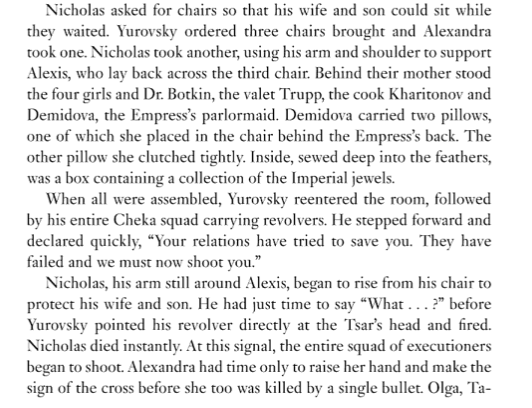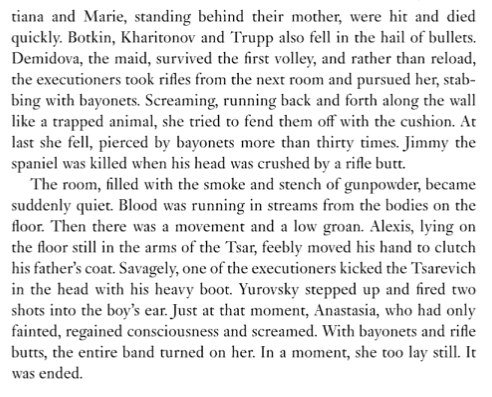Child Regicide And Jacobin
You may not have heard of the magazine Jacobin. It’s an intellectual magazine of the democratic socialist left — not the liberal left, but the democratic socialist left. It was founded in 2010 by Bhaskar Sunkara, a radical college student born and raised in suburban New York. From a 2016 Vox profile of him:
Jacobin has in the past five years become the leading intellectual voice of the American left, the most vibrant and relevant socialist publication in a very long time. And in 2016 it’s bigger than ever, thanks to Bernie Sanders, who’s making his millions of supporters curious about what democratic socialism actually means. That’s an opportunity that Jacobin is seizing to great effect, even if Sanders isn’t far enough left for their taste.
The Sanders campaign “could begin to legitimate the word ‘socialist,’ and spark a conversation around it, even if Sanders’s welfare-state socialism doesn’t go far enough,” Sunkara wrote earlier this year.
More:
Jacobin, which turned 5 this year, is perhaps the most relevant and important publication of the American political left today. Unlike more academic journals, it is always timely, globally oriented, and topically eclectic.
And:
Sunkara very explicitly does not want to take a line. Instead, he tells me, he draws a “box.” The magazine is not going to defend Stalin’s collectivizations or Mao’s Great Leap Forward or really any other aspect of “actually existing communism,” but other than that, Jacobin is pretty welcoming. It’s a place where social democrats and democratic socialists and Trotskyists and council communists and Chavistas and even the odd liberal can coexist.
Bhaskar Sunkara (The Nation)
That dynamic is a lot easier to foster now that the Cold War is over. When the USSR still existed and China was still meaningfully socialist, there were all kinds of fault lines along which socialist movements could fracture, because there were plenty of socialist nations making major decisions guaranteed to provoke controversy. Do you take Trotsky’s side or Stalin’s? Do you take Khrushchev’s side in the Sino-Soviet split or Mao’s? Do you endorse the Soviet invasion of Hungary in 1956 or stand with Hungarian workers? Do you merely oppose the Vietnam War or actively support the National Liberation Front?
Distance from that history lets Jacobin promote a very different brand of socialism without being overly defensive about the past or feeling a need to redbait those to its left for being insufficiently anti-communist or pro-American. This historical distance is also perhaps the reason young people are so receptive to the idea of socialism today.
Right, so take a look at what Jacobin’s founding editor posted (and then deleted) the other day:

You think? Here, from historian Robert Massie’s great book Nicholas and Alexandra, is how the little Romanov children, their parents, and a handful of servants met their end in the basement of the Ipatiev House in Yekaterinburg:


The founding editor of the leading intellectual voice of the American Left believes this was all fine. This is who he is. This is who they are.
And then, today, from the magazine’s account (this was also deleted):

Here’s the story. Excerpt:
The Wall was ugly, menacing, and, for many citizens, no doubt heartbreaking. But the economic and geopolitical stability it ensured also gave the GDR the chance to build a society that was broadly characterized by modest prosperity and social equality between classes and genders. Workers were guaranteed employment, housing, and all-day childcare, while basic foodstuffs and other goods were heavily subsidized. Though wages were only half of what they were in the West, adjusted for prices in relation to earnings, GDR workers’ actual purchasing power was more or less the same. This fact, combined with the chronic lack of certain consumer goods, taught citizens to rely on each other and help each other out in times of need — a reality that still resonates today in polls showing that Easterners are considerably more sensitive to social inequality and the importance of solidarity.
The fact that people were poor and had nothing to buy with what they did make — hey, it made them more caring for each other. Some were so caring that they quietly informed the Stasi when their neighbors, friends, even in some cases their spouses, failed to love Big Bruder. From the Washington Post:
The secret police, or Stasi, roped in an estimated 190,000 part-time secret informants and employed an additional 90,000 officers full time — in total, more than one in every 50 adult East Germans as of 1990. East Germans who dared to criticize their government — even to a spouse, a best friend or a pastor — could wind up disappearing into the penal system for years.
So, Jacobin. Let’s remember this line from the Vox profile:
Distance from that history [the Cold War] lets Jacobin promote a very different brand of socialism without being overly defensive about the past or feeling a need to redbait those to its left for being insufficiently anti-communist or pro-American.
What they’re counting on is a generation that has never learned what actually existing communism meant. It meant mass murder. It meant prison camps. It meant walls and constant surveillance. From my book Live Not By Lies:
Recently, a bright-eyed and cheerful twenty-six-year-old California woman told me that she thinks of herself as a communist. “It’s just so beautiful, this dream of everybody being equal,” she gushed. When she asked me what I was working on, I told her about the struggles of Alexander Ogorodnikov, a Christian dissident imprisoned and tortured by the Soviets, whom I had recently interviewed in Moscow. She fell silent.
“Don’t you know about the gulag?” I asked, naively.
Of course she didn’t. Nobody ever told her. We, her parents and grandparents, have failed her generation. And if develops no curiosity about the past, she will fail herself.
She’s not alone. Every year, the Victims of Communism Memorial Foundation, a nonprofit educational and research organization established by the US Congress, carries out a survey of Americans to determine their attitudes toward communism, socialism, and Marxism in general. In 2019, the survey found that a startling number of Americans of the post-Cold War generations have favorable views of left-wing radicalism, and only 57 percent of millennials believe that the Declaration of Independence offers a better guarantee of “freedom and equality” than the Communist Manifesto. The political religion that murdered tens of millions, imprisoned and tortured countless more, and immiserated the lives of half of humanity in its time, and the defeat of which required agonizing struggle by allies across borders, oceans, political parties, and generations—this hateful ideology is romanticized by ignorant young people.
Writing in the The Harvard Crimson in 2017, undergraduate Laura Nicolae, whose parents endured the horrors of Romanian communism, spoke out against the falsification of history that her fellow Ivy Leaguers receive, both in class and in the trendy Marxism of intellectual student culture.
“Depictions of communism on campus paint the ideology as revolutionary or idealistic, overlooking its authoritarian violence,” she writes. “Instead of deepening our understanding of the world, the college experience teaches us to reduce one of the most destructive ideologies in human history to a one-dimensional, sanitized narrative.”
Forgetting the atrocities of communism is bad enough. What is even more dangerous is the habit of forgetting one’s past. The Czech novelist Milan Kundera drily observes that nobody today will defend gulags, but the world remains full of suckers for the false utopian promises that bring gulags into existence.
Please order and read my book. It’s important. Just today I was having an exchange with a reader of this blog who talked about his students who are gone into woke militancy. He said that he now understands why Dostoevsky described the young radicals of the 1860s as “possessed.” This identity-politics leftism has seized their minds, and nothing else matters. The professor said that some of them — kids he knew before they got woke, and with whom he got along well — now look at him with inhuman hatred.
It’s the kind of hatred that can justify killing children for the sake of the revolution. And one day, will.
The post Child Regicide And Jacobin appeared first on The American Conservative.
Rod Dreher's Blog
- Rod Dreher's profile
- 503 followers



